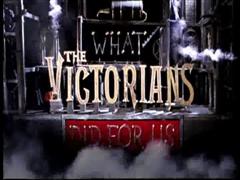What the Victorians Did for Us facts for kids
Quick facts for kids What the Victorians Did for Us |
|
|---|---|
 |
|
| Genre | Documentary |
| Presented by | Adam Hart-Davis |
| Country of origin | United Kingdom |
| Original language(s) | English |
| No. of episodes | 8 |
| Production | |
| Producer(s) |
|
| Editor(s) |
|
| Running time | 23 minutes |
| Release | |
| Original network | BBC Two |
| Original release | 3 September – 22 October 2001 |
What the Victorians Did for Us is a BBC documentary series from 2001. It explores how the Victorian era (1837-1901) shaped our world today. The show mainly focuses on the amazing scientific and social changes of that time. These changes led to the Industrial Revolution and set many of the rules for how we live.
Contents
Victorian Rules and Standards
The Victorian era was a time when people loved to create rules and standards. This helped organize many parts of life. From sports to science, the Victorians wanted clear guidelines.
Standardizing Sports
The Victorians helped make many sports what they are today. They wrote down the first official rules for association football, also known as soccer. These rules were based on older games.
Another popular sport they created was lawn tennis. Walter Clopton Wingfield invented it. This game allowed young men and women to play together. It was also more active than the slower game of croquet.
Rules for Home Life
Victorians also set rules for how people should behave at home. They created many formal dining rules. They even invented the fish knife!
Mrs Beeton was a famous writer. She wrote books with recipes and tips for running a household. Her guides helped many families manage their homes.
Advancing Medicine with Data
Florence Nightingale was a nurse during the Crimean War. She kept very detailed records of wounded soldiers. She used these facts to show how important simple hygiene was. Her work proved that cleanliness could save many lives.
Organizing Science
In 1869, Dmitri Mendeleev created the periodic table of the chemical elements. This table organized all known chemical elements. It even had empty spots for elements that had not been found yet. This was a huge step for chemistry.
Engineering with Precision
Joseph Whitworth was an engineer who developed important standards. He created rules for making parts that fit together perfectly. He also built a rifle with a very accurate barrel. His work made engineering much more precise.
Setting the Time and Location
The Greenwich Observatory in London became very important. It was used to set the official time for the entire country. It also defined the zero line of longitude. This line helps us measure locations around the world.

